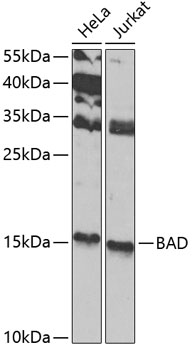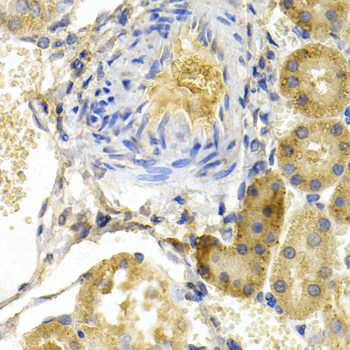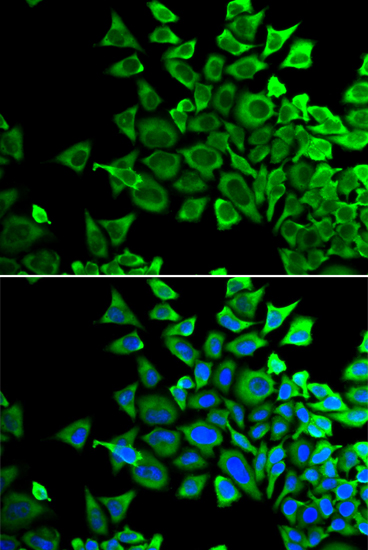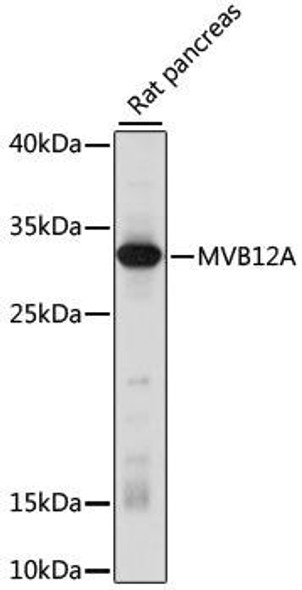Anti-BAD Antibody (CAB1593)
- SKU:
- CAB1593
- Product type:
- Antibody
- Reactivity:
- Human
- Mouse
- Rat
- Host Species:
- Rabbit
- Isotype:
- IgG
- Antibody Type:
- Polyclonal Antibody
- Research Area:
- Cell Death
Description
| Antibody Name: | Anti-BAD Antibody |
| Antibody SKU: | CAB1593 |
| Antibody Size: | 20uL, 50uL, 100uL |
| Application: | WB IHC IF |
| Reactivity: | Human, Mouse, Rat |
| Host Species: | Rabbit |
| Immunogen: | A synthetic peptide corresponding to a sequence within amino acids 110 to the C-terminus of human BAD (NP_004313.1). |
| Application: | WB IHC IF |
| Recommended Dilution: | WB 1:500 - 1:2000 IHC 1:50 - 1:200 IF 1:10 - 1:100 |
| Reactivity: | Human, Mouse, Rat |
| Positive Samples: | HeLa, Jurkat |
| Immunogen: | A synthetic peptide corresponding to a sequence within amino acids 110 to the C-terminus of human BAD (NP_004313.1). |
| Purification Method: | Affinity purification |
| Storage Buffer: | Store at -20°C. Avoid freeze / thaw cycles. Buffer: PBS with 0.02% sodium azide, 50% glycerol, pH7.3. |
| Isotype: | IgG |
| Sequence: | YGRE LRRM SDEF VDSF KKGL PRPK SAGT ATQM RQSS SWTR VFQS WWDR NLGR GSSA PSQ |
| Gene ID: | 572 |
| Uniprot: | Q92934 |
| Cellular Location: | Cytoplasm, Mitochondrion outer membrane |
| Calculated MW: | 18kDa |
| Observed MW: | 15kDa |
| Synonyms: | BAD, BBC2, BCL2L8, Bad |
| Background: | The protein encoded by this gene is a member of the BCL-2 family. BCL-2 family members are known to be regulators of programmed cell death. This protein positively regulates cell apoptosis by forming heterodimers with BCL-xL and BCL-2, and reversing their death repressor activity. Proapoptotic activity of this protein is regulated through its phosphorylation. Protein kinases AKT and MAP kinase, as well as protein phosphatase calcineurin were found to be involved in the regulation of this protein. Alternative splicing of this gene results in two transcript variants which encode the same isoform. |
| UniProt Protein Function: | BAD: a proapoptotic member of the Bcl-2 family. Displaces Bax from binding to Bcl-2 and Bcl-xL, resulting in cell death. Survival factors such as IL-3 can inhibit the apoptotic activity of Bad inducing the phosphorylation of Bad by Akt and p90RSK. 14-3-3 proteins bind phosphorylated Bad, inhibiting its binding to Bcl-2 and Bcl-xL. Phosphorylation by mitochondria-anchored PKA in the BH3 domain can block the dimerization of Bad and Bcl-xL. |
| UniProt Protein Details: | Protein type:Apoptosis Chromosomal Location of Human Ortholog: 11q13.1 Cellular Component: mitochondrial outer membrane; mitochondrion; cytosol Molecular Function:protein kinase B binding; protein binding; protein heterodimerization activity; phospholipid binding; caspase activator activity; lipid binding; protein kinase binding; protein phosphatase 2B binding Biological Process: response to oleate; nerve growth factor receptor signaling pathway; positive regulation of apoptosis; positive regulation of proteolysis; apoptosis; response to glucocorticoid stimulus; positive regulation of caspase activity; glucose homeostasis; cellular process regulating host cell cycle in response to virus; response to estradiol stimulus; positive regulation of apoptosis by virus; response to glucose stimulus; pore complex biogenesis; positive regulation of autophagy; positive regulation of glucokinase activity; caspase activation; response to drug; epidermal growth factor receptor signaling pathway; release of cytochrome c from mitochondria; fibroblast growth factor receptor signaling pathway; phosphoinositide-mediated signaling; cytokine and chemokine mediated signaling pathway; suppression by virus of host apoptosis; ADP metabolic process; positive regulation of insulin secretion; response to testosterone stimulus; response to amino acid stimulus; ATP metabolic process; glucose catabolic process; response to ethanol; positive regulation of T cell differentiation; induction of apoptosis via death domain receptors; DNA damage response, signal transduction resulting in induction of apoptosis; response to hydrogen peroxide; innate immune response; positive regulation of B cell differentiation; regulation of mitochondrial membrane permeability; response to progesterone stimulus; response to calcium ion; positive regulation of epithelial cell proliferation |
| NCBI Summary: | The protein encoded by this gene is a member of the BCL-2 family. BCL-2 family members are known to be regulators of programmed cell death. This protein positively regulates cell apoptosis by forming heterodimers with BCL-xL and BCL-2, and reversing their death repressor activity. Proapoptotic activity of this protein is regulated through its phosphorylation. Protein kinases AKT and MAP kinase, as well as protein phosphatase calcineurin were found to be involved in the regulation of this protein. Alternative splicing of this gene results in two transcript variants which encode the same isoform. [provided by RefSeq, Jul 2008] |
| UniProt Code: | Q92934 |
| NCBI GenInfo Identifier: | 17371773 |
| NCBI Gene ID: | 572 |
| NCBI Accession: | Q92934.3 |
| UniProt Secondary Accession: | Q92934,O14803, Q6FH21, |
| UniProt Related Accession: | Q92934 |
| Molecular Weight: | 168 |
| NCBI Full Name: | Bcl2-associated agonist of cell death |
| NCBI Synonym Full Names: | BCL2-associated agonist of cell death |
| NCBI Official Symbol: | BAD |
| NCBI Official Synonym Symbols: | BBC2; BCL2L8 |
| NCBI Protein Information: | bcl2-associated agonist of cell death; bcl2-L-8; BCL2-binding protein; bcl-2-like protein 8; BCL2-binding component 6; bcl-2-binding component 6; BCL-X/BCL-2 binding protein; bcl2 antagonist of cell death; BCL2-antagonist of cell death protein; bcl-XL/Bcl-2-associated death promoter |
| UniProt Protein Name: | Bcl2-associated agonist of cell death |
| UniProt Synonym Protein Names: | Bcl-2-binding component 6; Bcl-2-like protein 8; Bcl2-L-8; Bcl-xL/Bcl-2-associated death promoter; Bcl2 antagonist of cell death |
| Protein Family: | Bcl2-associated agonist of cell death |
| UniProt Gene Name: | BAD |
| UniProt Entry Name: | BAD_HUMAN |










